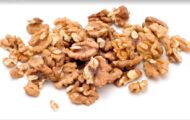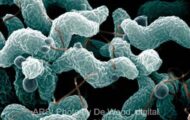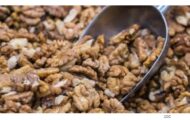Scientists at Oregon State University have made progress in the war against antibiotic resistant bacteria. More and more pathogenic bacteria are developing resistance against antibiotics, even our last-ditch drugs. Researchers have found that a molecule can neutralize bacteria's ability to become resistant to antibiotics. The study was published in the Journal of Antimicrobial Chemotherapy. This study is very important, since in September 2016, a woman in Nevada died from a bacterial infection that resisted every type of antibiotic we have in our arsenal. The death was reported by the Centers for Disease Control and Prevention last week. Scientists think that antibiotic-resistant bacteria will kill 10 million people by 2050. The molecule that the scientists at OSU constructed is … [Read more...]
Antibiotic Resistant Bacteria Reproduce Faster
A paper in the January 2017 edition of Nature Ecology & Evolution states that antibiotic-resistant bacteria grow faster and more efficiently than those that are not resistant to antibiotics. That is bad news in the fight against this deadly threat. Antibiotic resistant bacteria develop when the organisms are exposed to antibiotics. The drugs kill most of the bacteria, but some survive. And those that survive develop resistance to the drugs. Worse, they can pass that resistance on to other bacteria. The scientist from the University of Exeter were studying how E. coli bacteria develop resistance to antibiotics. In the study, they exposed the bacteria to doxycycline, a common antibiotic for treating infections. The bacteria quickly developed mutations for doxycycline … [Read more...]
Acid Suppression Drugs Increase Gastroenteritis Risk
A study published in the British Journal of Clinical Pharmacology has found that taking acid-suppressing medications increases the risk for bacterial gastroenteritis in the community and in hospital-based settings. The population-based, propensity-score matched cohort study was conducted at the University College London. The study identified 188,323 patients from a community in Scotland who took these drugs between 1999 and 2013. Those results were compared with 376,646 matched controls from the same community who did not take the prescribed medications. The medications in question include proton pump inhibitors (PPIs) and H2 receptor antagonists (H2RA). The study's authors reported positive test results for Clostridium difficile, Campylobacter, Salmonella, and E. coli O157 in … [Read more...]
E. coli Research Will Continue at University of Nebraska
An E. coli research program that has led to improved detection methods and food safety education at the University of Nebraska-Lincoln with continue.The $25 million project is investigating Shiga toxin-producing E. coli (STEC) strains that can contaminate beef. The project began in 2011. This type of bacteria can cause serious infections, which can lead to hemolytic uremic syndrome (HUS) in some cases. HUS can cause kidney failure and death. The project is in its final phase. It has also improved eradication techniques for meat-packing pants and has given scientists a better understanding of how the bacteria grows and proliferates. Dr. Rodney Moxley, a professor of veterinary medicine and biomedical sciences at the University and the project director said, "the whole goal is to … [Read more...]
University of Texas Develops Oral Salmonella Vaccine
Researchers at the University of Texas Medical Branch in Galveston have developed an oral vaccine against Salmonella bacteria. The article is published in Frontiers in Cellular and Infection Microbiology. Researchers at that facility have developed potential vaccines against Salmonella Typhimurium, but that vaccine was given as an injection. An oral vaccination is much simpler to give to patients. And it uses the same pathway that the bacteria took to enter the body. Dr. Ashok Copra, UTMB professor of microbiology and immunology said, "In the current study, we analyzed the immune responses of mice that received the vaccination by mouth as well as how they responded to a lethal dose of salmonella. We found that the orally administered vaccines produced strong immunity against … [Read more...]
Antibiotic Resistant Salmonella Causes 6,200 Illnesses Every Year
The Centers for Disease Control and Prevention (CDC) published a new report on the incidence of antibiotic-resistant Salmonella infections in the United States. Every year, about 6,200 people are sickened with these strains of antibiotic bacteria, but non-resistant Salmonella bacteria cause about 1.2 million illnesses every year in this country. Salmonella infections are one of the most common types of foodborne illness in this country and around the world. The antibiotics usually used to treat these infections include ceftriaxone, ciprofloxacin, and ampicillin. Unfortunately, antibiotic resistance has been associated with these drugs. Scientists at the CDC used Bayesian hierarchical models of 2004 - 2012 date from the CDC National Antimicrobial Resistance Monitoring System … [Read more...]
Damaged Salad Leaves Massively Stimulate Salmonella Growth
A study published this month in Applied and Environmental Microbiology, conducted at the University of Leicester, shows that juices from damaged salad leaves "massively" stimulate Salmonella growth. In fact, that lab study shows that those juices increase Salmonella growth 2,400 fold over a control group. The leached juices also increased the bacteria's ability to form a strong, wash-resistant attachment to salad leaves and they enhance the pathogen's virulence, increasing its ability to cause illness. This is all bad news for bagged salad lovers. Between 2000 and 2007 in the United States, there were 38 Salmonella outbreaks associated with leafy greens that sickened 1,409 people. Leafy greens and Salmonella as a produce-pathogen pair is the second most common risk for outbreaks. … [Read more...]
Organic Foods Not Automatically Safer Than Conventionally Grown
A study published in the Journal of Food Protection has found that while consumers think that organic foods are "safer" than conventionally grown or produced foods, the standards applied to those products do not directly address microbial or chemical safety issues. Researchers looked at the CDC's Foodborne Disease Outbreak Surveillance System in this study. They found that there have been 18 food poisoning outbreaks linked to organic foods from 1992 to 2014. Those outbreaks caused 779 illnesses, 258 hospitalizations and 3 deaths. Moreover, 56% of the outbreaks occurred from 2010 to 2014. Nine of the outbreaks were in a single state, and nine sickened people in more than one state. Salmonella bacteria caused most of the outbreaks, at 44%, and 33% of the outbreaks were caused by E … [Read more...]












